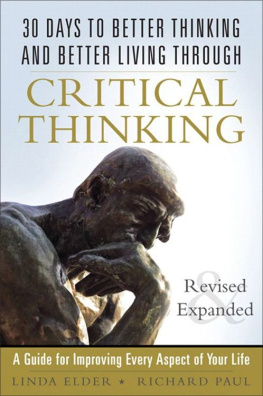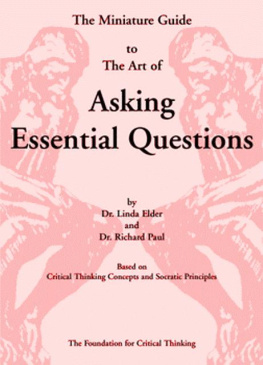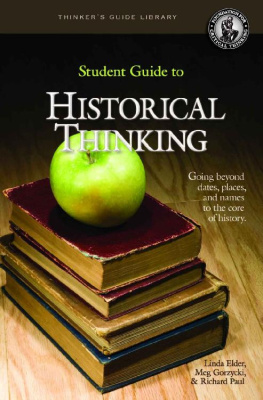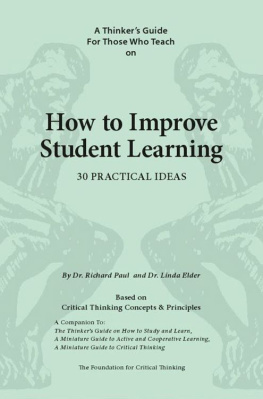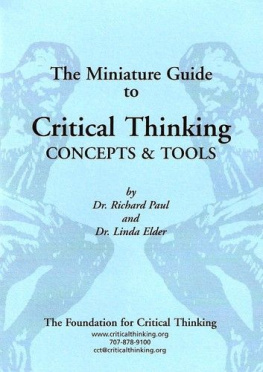In this appendix we differentiate skilled from unskilled reasoners, focusing on each element of thought individually.
All reasoning has a purpose.
Primary intellectual standards: | (1) clarity, (2) significance, (3) achievability, (4) consistency, (5) justifiability, (6) fairness |
Common problems: | (1) unclear, (2) trivial, (3) unrealistic, (4) contradictory, (5) unjustifiable, (6) unfair |
Principle: | To reason well, you must clearly understand your purpose, and your purpose must be reasonable and fair. |
| Skilled Reasoners | Unskilled Reasoners | Critical Reflections |
| take the time to state their purpose clearly. | are often unclear about their central purpose. | Have I made the purpose of my reasoning clear? What exactly am I trying to achieve? Have I stated the purpose in several ways to clarify it? |
| distinguish it from related purposes. | oscillate between different, sometimes contradictory, purposes. | What different purposes do I have in mind? How do I see them as related? Am I going off in somewhat different directions? How can I reconcile these contradictory purposes? |
| periodically remind themselves of their purpose to determine whether they are straying from it. | lose track of their fundamental object or goal. | In writing this historical paper, do I seem to be wandering from my purpose? How do my third and fourth paragraphs relate to my central goal? |
| adopt realistic purposes and goals. | adopt unrealistic purposes and set unrealistic goals. | Am I trying to accomplish too much in the paper? |
| choose significant purposes and goals. | adopt trivial purposes and goals as if they were significant. | What is the significance of pursuing this particular historical purpose? Is there a more significant purpose I should be focused on? |
| choose goals and purposes consistent with other goals and purposes they have chosen. | inadvertently negate their own purposes. do not monitor their thinking for inconsistent goals. | Does one part of my paper seem to undermine what I am trying to accomplish in another part? |
| adjust their thinking regularly to their purpose. | do not adjust their thinking regularly to their purpose. | Do I stick to the main issue throughout the paper? Am I acting consistently in pursuit of my purpose? |
| choose purposes that are fair, considering the desires and rights of others equally with their own desires and rights. | choose purposes that are self-serving at the expense of others needs and desires. | Do I have a self-serving purpose, which causes me to distort the information to fit that purpose? Am I taking into account the rights and needs of relevant others in pursuing this purpose? |
All reasoning is an attempt to figure something out, to settle some question, solve some problem.
Primary intellectual standards: | (1) clarity and precision, (2) significance, (3) answerability, (4) relevance, (5) depth |
Common problems: | (1) unclear and imprecise, (2) insignificant, (3) not answerable, (4) irrelevant, (5) superficial |
Principle: | To settle a question, it must be answerable; you must be clear about it and understand what is needed to adequately answer it. A deep question requires reasoning through its complexities. |
| Skilled Reasoners | Unskilled Reasoners | Critical Reflections |
| are clear about the question they are trying to settle. | are often unclear about the question they are asking. | Am I clear about the main question at issue? Am I able to state it precisely? |
| can re-express a question in a variety of ways. | express questions vaguely and find questions difficult to reformulate for clarity. | Am I able to reformulate my question in several ways to recognize the complexities in it? |
| can break a question into sub-questions. | are unable to break down the questions they are asking. | Have I broken down the main question into sub-questions to better think through its complexities? What sub-questions are embedded in the main question? |
| routinely distinguish questions of different types. | confuse questions of different types; thus often respond inappropriately to questions and expect the wrong types of answers from others. | Am I confused about the type of question I am asking? For example: Am I confusing a conceptual question with a factual one? Am I confusing a question of preference with a question requiring reasoned judgment? |
| distinguish significant from trivial questions. | confuse trivial with important questions. | Am I focusing on superficial questions while significant questions need addressing? |
| distinguish relevant from irrelevant questions. | confuse irrelevant questions with relevant ones. | Are the questions Im raising in this paper relevant to the main question at this issue? |
| are sensitive to the assumptions built into the questions they ask. | often ask loaded questions. | Am I phrasing the question in a loaded way? Am I taking for granted, from the outset, the correctness of my own position? |
| distinguish questions they can answer from questions they cant. | try to answer questions they are not in a position to answer. | Am I in a position to answer this question? What information would I need before I could answer it? |
All reasoning is based on data, information, evidence, experience, research.
Primary intellectual standards: | (1) clear, (2) relevant, (3) important, (4) fairly gathered and reported, (5) accurate, (6) adequate, (7) consistently applied |
Common problems: | (1) unclear, (2) irrelevant, (3) insignficant, (4) biased, (5) inaccurate, (6) insufficient, (7) inconsistently applied |
Principle: | Reasoning can be only as sound as the information upon which it is based. |
| Skilled Reasoners | Unskilled Reasoners | Critical Reflections |
| assert a claim only when they have sufficient evidence to back it up. | assert claims without considering all relevant information. | Is my assertion supported by evidence? Do I have enough evidence to truly support my claim? |
| can articulate and evaluate the information behind their claims. | dont articulate the information they are using in their reasoning and so do not subject it to rational scrutiny. | Have I been transparent about the information I am using? What standards am I using to evaluate the information? Do I have evidence to support my claim that I havent clearly articulated? |
| actively search for information against (not just for) their own position. | gather only that information that supports their own point of view. | Where is a good place to look for evidence on the opposite side? Have I looked there? Have I honestly considered information that doesnt support my position? |
| focus on relevant information and disregard what is irrelevant to the question at issue. |


